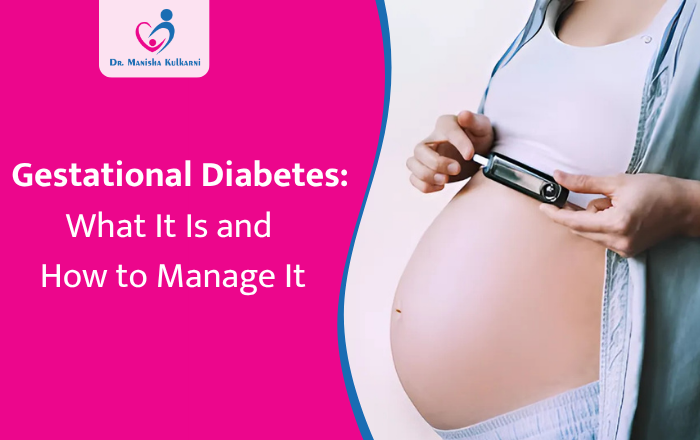Pregnancy is full of changes some expected, some not so much. If you’ve been told you have gestational diabetes, it might feel overwhelming at first. You’re not alone, and the good news is, with the right steps, this condition can be managed safely for both you and your baby.
This guide breaks down what gestational diabetes really means, why it happens, how to spot it, and what you can do to stay healthy during pregnancy.
What Is Gestational Diabetes?
Gestational diabetes is a type of diabetes that develops during pregnancy, usually between the 24th and 28th week. It means your body isn’t processing sugar (glucose) the way it should. Instead, sugar builds up in your blood, leading to higher-than-normal levels.
Unlike type 1 or type 2 diabetes, gestational diabetes only occurs during pregnancy. But it still needs attention — for your health and your baby’s.
Why Does It Happen?
Pregnancy changes the way your body uses insulin — the hormone that helps sugar move from your blood into your cells for energy. Some pregnancy hormones block insulin’s effect. This is called insulin resistance.
When your body can’t make enough insulin to keep up, blood sugar levels rise. That’s what causes gestational diabetes.
You’re more likely to develop it if you:
- Are over age 25
- Are overweight
- Have a family history of diabetes
- Had gestational diabetes in a previous pregnancy
- Have polycystic ovary syndrome (PCOS)
Common Symptoms of Gestational Diabetes
Some women don’t notice any symptoms at all — which is why regular screening during pregnancy is important.
If symptoms do show up, they might include:
- Feeling thirstier than usual
- Needing to pee more often
- Feeling more tired than normal
- Blurred vision
Again, many of these can feel like regular pregnancy symptoms, so don’t rely on symptoms alone. Testing is key.
How Is Gestational Diabetes Diagnosed?
Most women get tested between 24 and 28 weeks of pregnancy. If you have risk factors, your doctor may test earlier.
The test is called a glucose tolerance test. You’ll drink a sugary liquid, and your blood sugar will be checked over a few hours to see how your body handles it.
If your numbers are higher than normal, you’ll be diagnosed with gestational diabetes — and your care team will help you take the next steps.
Is Gestational Diabetes Dangerous?
Gestational diabetes can cause problems if it’s not managed. But if caught early and treated properly, most women go on to have healthy pregnancies.
Here’s what can happen if it’s not under control:
- For the baby: high birth weight, premature birth, breathing issues at birth, low blood sugar after delivery
- For the mother: higher chance of needing a C-section, high blood pressure, risk of developing type 2 diabetes later
That’s why it’s so important to keep blood sugar levels in check throughout pregnancy.
How to Manage Gestational Diabetes Safely
Managing this condition is mostly about building healthy habits. Here’s what helps:
1. Follow a Balanced, Low-GI Diet
You don’t need to give up carbs — but you do need to choose the right ones. Focus on foods that keep your blood sugar steady.
Eat more of:
- Whole grains (brown rice, oats)
- Lentils, beans
- Non-starchy vegetables (spinach, broccoli, carrots)
- Lean protein (eggs, chicken, tofu)
- Healthy fats (nuts, seeds, avocado)
Avoid or limit:
- Sugary drinks
- White bread, white rice
- Packaged snacks
- Fried and greasy food
Sample meal idea:
Grilled chicken, quinoa, and sautéed vegetables + a handful of almonds for a snack.
2. Stay Active (Safely)
Exercise helps your body use insulin more efficiently, which keeps blood sugar in check.
Good options during pregnancy:
- Brisk walking
- Prenatal yoga
- Swimming
- Light household chores
Aim for 30 minutes a day, but check with your doctor before starting anything new.
3. Monitor Your Blood Sugar Regularly
You’ll need to check your sugar levels several times a day:
- In the morning (fasting)
- 1 or 2 hours after meals
Your doctor will guide you on target numbers, but most women aim to keep fasting levels under 95 mg/dL and post-meal levels under 140 mg/dL (1 hour) or 120 mg/dL (2 hours).
4. Medication If Needed
If diet and activity aren’t enough to control your sugar levels, you might need insulin or other medications. This doesn’t mean you’ve failed sometimes your body just needs extra help.
Your doctor will explain when and how to use it safely during pregnancy.
5. Stay in Touch With Your Doctor
You’ll need more frequent checkups to track sugar levels, baby’s growth, and any other health changes. These visits help make sure both you and your baby are doing well.
Gestational Diabetes After Birth: What Happens Next?
For most women, gestational diabetes goes away after delivery. But that doesn’t mean you can forget about it entirely.
You’ll need a follow-up glucose test about 6–12 weeks after birth to confirm your sugar levels are back to normal.
Also, having gestational diabetes raises your chances of:
- Getting it again in a future pregnancy
- Developing type 2 diabetes later in life
That’s why eating well and staying active even after birth really pays off.
When Should You Call a Specialist?
Reach out to a doctor if:
- Your sugar levels are high even with diet changes
- You’re feeling lightheaded, dizzy, or weak
- You’re confused about what to eat or how to test sugar levels
- You had gestational diabetes before and are now pregnant again
Getting help early can make all the difference.
FAQ
1. Can gestational diabetes go away during pregnancy?
No, but it usually goes away after the baby is born.
2. Can I have a normal delivery with gestational diabetes?
Yes, many women do — especially if sugar levels are well controlled.
3. Does it mean my baby will have diabetes?
Not necessarily. But it may increase your baby’s risk of obesity or type 2 diabetes later in life.
4. Can I prevent gestational diabetes?
Not always, but staying active, eating well, and maintaining a healthy weight before and during pregnancy can help lower the risk.
Don’t Try to Manage It Alone
Gestational diabetes may feel like one more thing to worry about, but it doesn’t have to take over your pregnancy. With the right steps eating better, staying active, checking your sugar levels, and working closely with your doctor — you can stay in control.
Need guidance?
Booking a consultation with Dr. Manisha Kulkarni, a trusted gynaecologist and obstetrician in Magarpatta. She has helped many women navigate pregnancy with care, confidence, and clarity. If you’ve been diagnosed with gestational diabetes or just want to make sure you’re on the right track, she’s the one to talk to.


